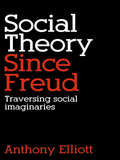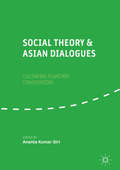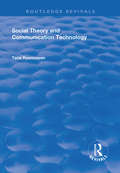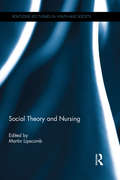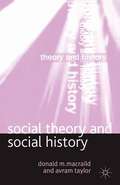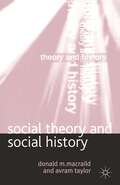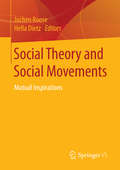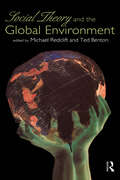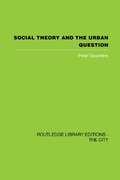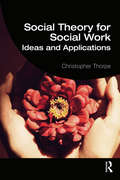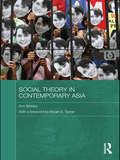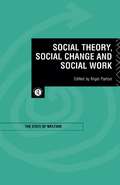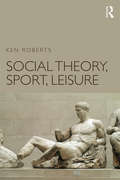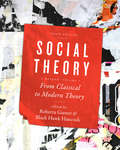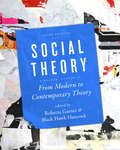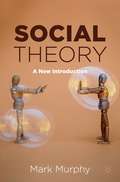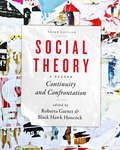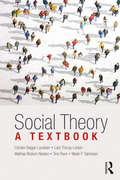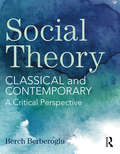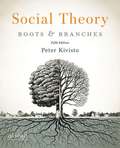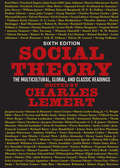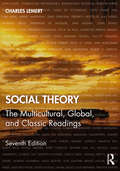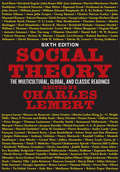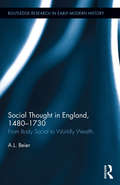- Table View
- List View
Social Theory Since Freud: Traversing Social Imaginaries
by Anthony ElliottIn this compelling book, Anthony Elliott traces the rise of psychoanalysis from the Frankfurt School to postmodernism. Examining how pathbreaking theorists such as Adorno, Marcuse, Lacan and Lyotard have deployed psychoanalysis to politicise issues such as desire, sexuality, repression and identity, Elliott assesses the gains and losses arising from this appropriation of psychoanalysis in social theory and cultural studies.Moving from the impact of the Culture Wars and recent Freud-bashing to contemporary debates in social theory, feminism and postmodernism, Elliott argues for a new alliance between sociological and psychoanalytic perspectives.
Social Theory and Asian Dialogues: Cultivating Planetary Conversations
by Ananta Kumar GiriCritically exploring the presuppositions of contemporary social theory, this collection argues for a trans-civilizational dialogue and a deepening of the universe of intellectual discourse in order to transform sociology into a truly planetary conversation on the human condition. Focusing on perspectives from Asia, notably East Asia and India, it interrogates presuppositions in contemporary critical social theory about man, culture and society, and considers central themes such as knowledge and power, knowledge and liberation. The diverse contributions tackle key questions such the globalization of social theory, identity and society in east asia, as well as issues such as biopolitics, social welfare and eurocentrism. They also examine dialogues along multiple trajectories between social theorists from the Euro-American world and from the Asian universe, such as between Kant and Gandhi, Habermas and Sri Aurobindo, the Bildung tradition in Europe and the Confucian traditions. Arguing for a global comparative engagement and cross-cultural dialogue, this is a key read for all those interested in the future of social theory in the wake of globalization and the rise of the global south.
Social Theory and Communication Technology (Routledge Revivals)
by Terje RasmussenThis title was first published in 2001. An investigation of new forms of interaction and communication. The essays address theoretical contributions and insights which may assist us in the understanding of modern society inhabited by a wide range of new media.In order to answer questions on this subject, the text suggests a "structural hermeneutic" - a view on the public as agents embedded in their lifeworlds (rather than as consumers and receivers), who play a large part in reproducing structural and distanciated processes of meaning. The essays explore the implications of such daily practices as making a telephone call or sending an email, receiving money from a bank machine using a credit card, or retrieving information from a Web site. Each of these practices reproduce patterns of information and communication practices, which reshape communication processes in society. The essays examine the relationship between media change and social change, with particular emphasis on their contribution to social interaction in everyday life and in the reproduction of social systems.
Social Theory and Nursing (Routledge Key Themes in Health and Society)
by Martin LipscombDespite noteworthy exceptions, nursing’s literature largely disregards the ways in which social and sociological theory permeates, guides and shapes research, education, and practice. Likewise, social theory’s ability to position nursing within wider structures of healthcare and educational provision is similarly and puzzlingly downplayed. The questions nurses ask and the problems they face cannot however, adequately be addressed without engaging with social and sociological theory and, to progress this engagement, contributors to this book explore how social theories are used by and might apply to nursing and nursing practice. The book draws on a wide range of perspectives – philosophical, theoretical, empirical and political – to offer a robust and wide-ranging critique and analysis. Social Theory and Nursing is essential reading for nursing researchers, academics and educators, as well as scholars and researchers in medical sociology, medicine and allied health.
Social Theory and Social History
by Donald M. Macraild Avram TaylorThe expansion of social history that took place in the twentieth century has produced some of the most exciting works in the field of historical studies. As the range of the social historian's concerns has grown, so has the range of methodologies and theoretical approaches they employ. Historians have made greater use of the theoretical insights of social scientists, and boundaries between the disciplines have become blurred as a consequence. Social Theory and Social History: - covers the major developments within social history - offers an introduction to the most important social theorists - discusses the relationship between history and the social sciences - considers the use of theory in the writing of history - examines current debates within historiography In this concise introductory guide, Donald M. MacRaild and Avram Taylor explore the complex relationship between social theory and social history, arguing that an awareness of the relation between the two is the key to a deeper understanding of the process of historical change.
Social Theory and Social History (Theory and History)
by Avram Taylor Donald MacRaildThe expansion of social history that took place in the twentieth century has produced some of the most exciting works in the field of historical studies. As the range of the social historian's concerns has grown, so has the range of methodologies and theoretical approaches they employ. Historians have made greater use of the theoretical insights of social scientists, and boundaries between the disciplines have become blurred as a consequence. Social Theory and Social History:- covers the major developments within social history- offers an introduction to the most important social theorists- discusses the relationship between history and the social sciences- considers the use of theory in the writing of history- examines current debates within historiographyIn this concise introductory guide, Donald M. MacRaild and Avram Taylor explore the complex relationship between social theory and social history, arguing that an awareness of the relation between the two is the key to a deeper understanding of the process of historical change.
Social Theory and Social Movements
by Jochen Roose Hella DietzThe volume will address two questions arising in the context of social movements: What do we learn about social movements by adopting the perspectives offered by specific social theories? Can the confrontation with social movements also help to further develop or revise these social theories? Social movements are not only a potential challenge to societies, they also challenge social theory. "Social Theory and Social Movements" systematically explores the implications of this social force for theory building in the social sciences. From this double vantage point, the book discusses the theories of social movements of Niklas Luhmann, Jeffrey Alexander, Michel Foucault, Pierre Bourdieu and Judith Butler, as well as Rational Choice Theory, Relational Sociology and Organizational Neo‐Institutionalism.
Social Theory and the Global Environment (Global Environmental Change Ser.)
by Ted Benton Michael RedcliftThis book marks a watershed in the social sciences. The qualitative, critical perspective of sociology and allied disciplines challenges the technocentric `managerialism' which dominates environmental policy, its discourse and its impact. The authors explore the relationship between social theory and sustainability in an attempt to transend technical rhetoric and embrace a broader understanding of `nature'.
Social Theory and the Urban Question
by Peter SaundersSocial Theory and the Urban Question offers a guide to, and a critical evaluation of key themes in contemporary urban social theory, as well as a re-examination of more traditional approaches in the light of recent developments and criticism. Dr Saunders discusses current theoretical positions in the context of the work of Marx, Weber and Durkheim. He suggests that later writers have often misunderstood or ignored the arguments of these 'founding fathers' of the urban question. Dr Saunders uses his final chapter to apply the lessons learned from a review of their work in order to develop a new framework for urban social and political analysis. This book was first published in 1981.
Social Theory for Social Work: Ideas and Applications (Student Social Work)
by Christopher ThorpeTrying to understand how the world looks through the eyes of individuals and groups and how it shapes the ways they think and act is something social workers do all the time. It is what social theorists do too. This book identifies and explains in a highly accessible manner the absolute value of social theory for social work. Drawing on the theoretical ideas and perspectives of a wide range of classical and modern social theorists, the book demonstrates the insights their work can bring to bear on a wide range of social work practice scenarios, issues and debates. Departing with the work of the classical theorists, the book covers a diverse range of theoretical traditions including phenomenology, symbolic interactionism, Norbert Elias, Michel Foucault, Pierre Bourdieu, feminism and globalization theory. Putting to work ideas from these different perspectives, a range of social work scenarios, issues and debates are opened up and explored. The final chapter brings together the various theoretical strands, and critically considers the contribution they can make towards realizing core social work values in a rapidly globalizing world. Demonstrating exactly how and in what ways social theory can make important and enduring contributions to social work, Social Theory for Social Work is essentialial reading for social work students, practitioners and professionals alike.
Social Theory in Archaeology and Ancient History
by Geoff EmberlingAt a time when archaeology has turned away from questions of the long-term and large scale, this collection of essays reflects on some of the big questions in archaeology and ancient history - how and why societies have grown in scale and complexity, how they have maintained and discarded aspects of their own cultural heritage, and how they have collapsed. In addressing these long-standing questions of broad interest and importance, the authors develop counter-narratives - new ways of understanding what used to be termed 'cultural evolution'. Encompassing the Middle East and Egypt, India, Southeast Asia, Australia, the American Southwest and Mesoamerica, the fourteen essays offer perspectives on long-term cultural trajectories; on cities, states and empires; on collapse; and on the relationship between archaeology and history. The book concludes with a commentary by one of the major voices in archaeological theory, Norman Yoffee.
Social Theory in Contemporary Asia (Routledge Studies in Social and Political Thought)
by Ann BrooksPhilosophical debates around individualization and the implications for intimacy, reflexivity and identity have occupied a central part of social and cultural theorizing in the West in the last decade. In fact, late modernity has become conspicuously engaged with issues of intimacy, reflexivity and identity. The author analyses the relevance of these debates in the context of contemporary Asia and combines an analysis of significant social theorists including Beck, Giddens, Bourdieu, McNay, Adkins, and Ong with an application of these debates to social, political and cultural contexts. Drawing on empirical research, case studies, global reports, media and academic literature, the book provides a relevant, wide-ranging and contemporary analysis of the debates on Asian culture and society. In the Foreword to the book Bryan Turner comments: ‘Professor Brooks shows consequently that the intimate and emotional cultures that have been described by Anthony Giddens and Ulrich Beck with respect to the West have not arrived in Asia or at least that they have not become visible and permanent aspects of the social landscape.’
Social Theory, Social Change and Social Work
by Nigel PartonSocial Theory, Social Change and Social Work has two inter-related themes. First to account for and analyse current changes in social work and secondly, to assess how far recent developments in social theory can contribute to their interpretation. Representing the work of a range of academics all involved in research and teaching in relation to social work, it considers issues of central significance to everyone interested in the theory, policy, and practice of social work.
Social Theory, Sport, Leisure
by Ken RobertsKen Roberts’ Social Theory, Sport and Leisure offers a clear, compact primer in social theory for students needing to engage with the application of sociological perspectives to the study of sport and leisure. Written in a straightforward style and assuming no prior knowledge, the book offers a fresh and easy to read overview of sociology’s contribution to sport and leisure studies. Ordered chronologically, each chapter: Focuses on the work of a major social theorist and their most influential ideas Provides helpful historical and biographical detail to set the person and their thinking in contemporary context Identifies questions in sport and leisure on which the theory can shed useful light Considers how the ideas can be, or have been, applied in the study of sport and leisure Works as a self-contained unit, enabling students and lecturers to use the book flexibly according to their needs. Written by an outstanding sociologist of leisure and sport, this intelligent yet jargon-free textbook enables students to get to grips with a wide range of important concepts and understand their diverse applications. As such, it is essential reading for any course designed to explore the place and meaning of sport and leisure in society.
Social Theory, Volume I: From Classical to Modern Theory, Third Edition
by Black Hawk Hancock Roberta GarnerThe third edition of this popular reader reflects considerable changes. The framework for understanding theory as a set of conversations over time is maintained and deepened, pairing classical with contemporary readings to illustrate the ways in which theory continues to be reinterpreted over time. Volume I has been completely reorganized, with new contextual and biographical materials surrounding the primary readings, and end-of-chapter study guides that include key terms, discussion questions, and innovative classroom exercises. The result is a fresh and expansive take on social theory that foregrounds a plurality of perspectives and reflects contemporary trends in the field, while being an accessible and manageable teaching tool.
Social Theory, Volume II: From Modern to Contemporary Theory, Third Edition
by Black Hawk Hancock Roberta GarnerThe third edition of this popular reader reflects considerable changes. The framework for understanding theory as a set of conversations over time is maintained and deepened, but Volume II now begins with a focus on key transitional theorists who helped reconceive of classical theory in new ways. Extending from the classical tradition, chapters on race, gender, culture, media and globalization show how contemporary theory builds on the past even as it moves in new directions. New contextual and biographical materials surround the primary readings, and each chapter includes a study guide with key terms, discussion questions, and innovative classroom exercises. The result is a fresh and expansive take on social theory that foregrounds a plurality of perspectives and reflects contemporary trends in the field, while being an accessible and manageable teaching tool.
Social Theory: A New Introduction
by Mark MurphyThis textbook delivers a new thematic introduction to social theory that explores theoretical issues in their contemporary social contexts. Each chapter is devoted to a specific thematic area, including the state, governance, the economy, civil society, culture, language, knowledge, the self, emotions, the body, and social justice. Each chapter details the key issues for debate and the relevant theories while linking those debates and theories to everyday life. Distributed throughout the chapters are focused sections on key concepts and their research applications, alongside helpful additional detail including a glossary, further suggested readings, chapter summaries, and questions for discussion. The book also provides useful information on key theoretical movements such as feminism, Marxism, and post-structuralism, as well as biographies of key theorists. As such, it reflects the breadth of social theory and its interdisciplinary nature by drawing on thinkers not just from sociology, but also from philosophy, history, literature, geography, cultural and gender studies.The book’s logical structure and clear pedagogical features make it an appealing and accessible introductory text for students new to social theory. The chapters demonstrate the relevance of social theory to everyday life, such that readers can understand and actively engage with key concepts.
Social Theory: A Reader, Third Edition
by Black Hawk Hancock Roberta GarnerThe third edition of this popular reader reflects considerable changes. With over seventy readings representing a wide diversity of theorists, it offers a breadth of coverage not available in other collections. The framework for understanding theory as a set of conversations over time is maintained and deepened, with a focus on key transitional theorists who helped pave the way from classical to contemporary theory. New contextual and biographical materials surround the primary readings, and each chapter includes a study guide with key terms, discussion questions, and innovative classroom exercises. The result is a fresh and expansive take on social theory that foregrounds a plurality of perspectives and defines contemporary trends in the field, while being both an accessible and manageable teaching tool.
Social Theory: A Textbook
by Lars Thorup Larsen Mads P. Sørensen Mathias Wullum Nielsen Tine Ravn Carsten Bagge LaustsenThis textbook offers a new approach to understanding social theory. Framed around paired theoretical perspectives on a series of sociological problems, the book shows how distinctive viewpoints shed light on different facets of social phenomena. The book includes sociology’s "founding fathers", major 20th-century thinkers and recent voices such as Butler and Zizek. Philosophically grounded and focused on interpretation and analysis, the book provides a clear understanding of theory’s scope while developing students’ skills in evaluating, applying and comparing theories.
Social Theory: Classical and Contemporary – A Critical Perspective
by Berch BerberogluSocial Theory provides a sophisticated yet highly accessible introduction to classical and contemporary social theories. The author’s concise presentation allows students and instructors to focus on central themes. The text lets theorists speak for themselves, presenting key passages from each theorist’s corpus, bringing theory to life. The approach allows instructors the opportunity to help students learn to unpack sometimes complex prose, just as it offers inroads to class discussion. Chapters on Addams and early feminism, on Habermas and the Frankfurt School, on Foucault, and on globalization and social movements round out contemporary coverage. The book presents and explains key theories, just as it provides an introduction to central debates about them.
Social Theory: Roots And Branches (Fifth Edition)
by Peter KivistoEdited by Peter Kivisto, this acclaimed collection of accessible primary source readings enables students to experience "firsthand" a wide range of perspectives that are shaping current sociological theory. Now in its fifth edition, Social Theory: Roots and Branches covers both classical theory (the roots) and contemporary theory (the branches) and shows how they are linked. Part One features work from such well-known classical theorists as Marx, Durkheim, Weber, and Simmel. It also presents selections by theorists outside of the discipline and from writers who are often overlooked in competing collections, including W. E. B. Du Bois, Charlotte Perkins Gilman, and Harriet Martineau. Part Two offers readings that illustrate major contemporary theoretical approaches, ending with a section on cutting-edge directions in theoretical discourse. Now featuring a revised and expanded introductory chapter, this fifth edition offers seventeen new readings, including eight by theorists who are new to this collection.
Social Theory: The Multicultural, Global, and Classic Readings
by Charles LemertFor nearly a quarter-century, Charles Lemert has shared his love of social theory, and the questions it explores, in this collection of readings. With 140 selections that begin in the nineteenth century and end in 2015, Social Theory charts the long arc of the development of the field. This edition retains classic texts by Karl Marx, Emile Durkheim, Max Weber, and W.E.B. Du Bois and writings of major contemporary figures like Audre Lorde and Patricia Hill Collins, while adding pieces from Harriet Martineau, Friedrich Nietzsche, Kimberlé Williams Crenshaw, Thomas Piketty, and Ta-Nehisi Coates, among others. Revised and updated with a new section exploring social theory at the limits of the social, Lemert's Social Theory remains essential reading.
Social Theory: The Multicultural, Global, and Classic Readings
by Charles LemertSocial Theory is more than a reader. Feminists, race theorists, decolonizing leaders, and others are thoughtfully introduced by Charles Lemert’s substantial commentaries. Social Theory has always sought to keep up with the new while respecting the old—from Durkheim and Weber to Latinx and LGBTQ pioneers. When the book first appeared it was, as it remains, a collection of selections from those who have changed how we think about social things. Today, as the world is threatened by a global wave of anti-democratic movements, Social Theory adds a new early section to remind us of the origins of democratic values in 1700s. A new concluding section focuses the theoretical mind on how, in the 2020s, social theorists are rethinking the world in order to better understand and resist the menace of anti-democratic movements.
Social Theory: The Multicultural, Global, and Classic Readings (Sixth Edition)
by Charles LemertFor nearly a quarter-century, Charles Lemert has shared his love of social theory, and the questions it explores, in this collection of readings. With 140 selections that begin in the nineteenth century and end in 2015, Social Theory charts the long arc of the development of the field. This edition retains classic texts by Karl Marx, Emile Durkheim, Max Weber, and W.E.B. Du Bois and writings of major contemporary figures like Audre Lorde and Patricia Hill Collins, while adding pieces from Harriet Martineau, Friedrich Nietzsche, Kimberly Williams Crenshaw, Thomas Piketty, and Ta-Nehisi Coates, among others. Revised and updated with a new section exploring social theory at the limits of the social, Lemert's Social Theory remains essential reading.
Social Thought in England, 1480-1730: From Body Social to Worldly Wealth
by A.L. BeierAuthorities ranging from philosophers to politicians nowadays question the existence of concepts of society, whether in the present or the past. This book argues that social concepts most definitely existed in late medieval and early modern England, laying the foundations for modern models of society. The book analyzes social paradigms and how they changed in the period. A pervasive medieval model was the "body social," which imagined a society of three estates – the clergy, the nobility, and the commonalty – conjoined by interdependent functions, arranged in static hierarchies based upon birth, and rejecting wealth and championing poverty. Another model the book describes as "social humanist," that fundamentally questioned the body social, advancing merit over birth, mobility over stasis, and wealth over poverty. The theory of the body social was vigorously articulated between the 1480s and the 1550s. Parts of the old metaphor actually survived beyond 1550, but alternative models of social humanist thought challenged the body concept in the period, advancing a novel paradigm of merit, mobility, and wealth. The book’s methodology focuses on the intellectual context of a variety of contemporary texts.
